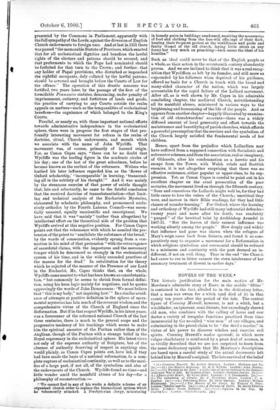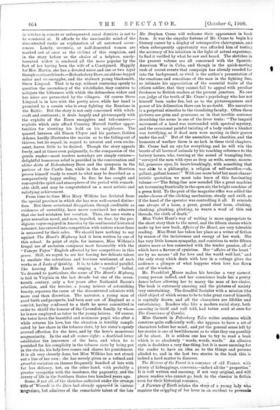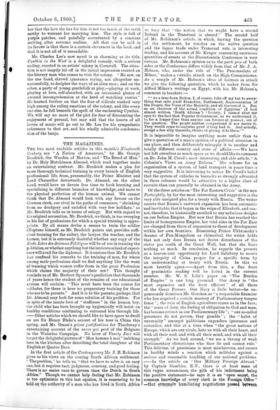NOVELS OF THE WEEK.*
THE historic justification for the main motive of Mr. Morrison's admirable story of Essex in the middle " fifties " is contained in the fact, alluded to in the dedicatory letter, that a man was swum for a witch (and died of it) in that county ten years after the period of the tale. The central figure of Cunning Murrell, however, is not a witch, but a witchfinder; an ignorant, semi-literate, but exceedingly shrewd old man, who combines with the calling of horse and cow doctor a variety of irregular functions practised from time immemorial by the so-called "wise men" of our villages, and culminating in the proud claim to be "the devil s master," in virtue of hie power to discover witches and exorcise evil spirits. Cunning Murrell's =otitis operandi, in which mere vulgar charlatanry is reinforced by a great deal of acumen, is so vividly described that we are not surprised to learn from the same dedicatory epistle that Mr. Morrison's descriptions are based upon a careful study of the actual documents left behind him by Murrell's original. The late survival of the belief • (1.) Cunning Murrell. By Arthur Morrison. London : Methuen and Co. [Gs.)—(2.) She Heart'a Highway. By M. E. Wilkins. London: John Murray. (6s.]—(3.) Wounds in the Rain: a Collection of Stories relating to the Spanish. American War of 1898. By Stephen Crane. London: Methuen and Co. [Os.]— (4.) Agairs of the Heart. By Violet Hunt. London: S. T. Freecoantle. Da.]— (5.) The Conscience of Coralle. By F. Frankfort Moore. London : C. A. Pearson. [8s.)—(6.) Petersburg Tales. By Olive Garnett. London: William Heineman]. Les.)—(7.) The Heiress of the Forest. By Eleanor C. Price. London nil:aster and Co. Vol-04 Furnace of Earth. By Heals Erminie Rives. London: Grant Richards. [es.:—(5.) Cynthia In the Weal. By Charles Lee. London : Grant Itichard.. Los]
in witches in remote or unfrequented rural districts is not to be wondered at. It affords to the unscientific mind of the discontented rustic an explanation of all untoward occur- rences. Lonely, eccentric, or half-demented women are marked out at once as the victims of this suspicion, and in the story before us the choice of a helpless, sorely- bereaved widow is rendered all the more popular by the fact of her having been the wife of a Coastguard. Happily for Mrs. Martin, she has a devoted niece and one or two loyal though cautious friends,—Roboshobery Dove, an old one-legged sailor and ex-smuggler, and the stalwart young blacksmith, Steve Lingood. That is to say, without venturing openly to question the ascendency of the witchfinder, they contrive to mitigate the bitterness with which the defenceless widow and her niece are persecuted by the villagers. Of course Steve Lingood is in love with the pretty niece, while her hand is promised to a cousin who is away fighting the Russians in the Baltic. But the story is not only concerned with witch- craft and sentiment; it deals largely and picturesquely with the exploits of the Essex smugglers and tub-runners,- exploits which only afford Cunning Murrell further oppor- tunities for rivetting his hold on his neighbours. The quarrel between old Simon Cloyse and his partner, Golden Adams, hardly illustrates the maxim as to the falling-out of thieves, but its sequel, in regard to interest and even excite- ment, leaves little to be desired. Though the story appeals freely, and at times even poignantly, to the compassion of the gentle reader—most readers nowadays are simply curious— delightful humorous relief is provided in the conversation and obiter dicta of Eoboshobery Dove and the symposia in the parlour of the Castle Inn, while in the end Mr. Morrison proves himself ready to resort to what may be described as a comparatively happy ending. In fine, he has caught and conveyed the spirit and atmosphere of the period with remark- able skill, and may be congratulated on a most artistic and satisfying achievement.
From time to time Miss Mary Wilkins has deviated from the special province in which she has won well-earned distinc- tion. But these occasional divagations, though creditable as evidences of versatility, have never convinced her admirers that she had mistaken her vocation. Thus, she once wrote a prize 'sensation novel, and now, beguiled, we fear, by the pro- digious vogue enjoyed in America by the sentimental historical romance, has entered into competition with writers whose fame is measured by their sales. We should have nothing to say against The Heart's Highway had it been written by one of this school. In point of style, for instance, Miss Wilkins's frugal use of archaism compares most favourably with the " Fancye Fayre" English affected by her competitors in this genre. Still, we regret to see her forcing her delicate talent to emulate the robustious and luscious sentiment of such works as A Lady of Quality. It is, to take a musical parallel, like hearing Mlle. Landi singing a " royalty " ballad. To descend to particulars, the scene of The Heart's Highway is laid in Virginia in the last decade but one of the seven- teenth century, only a few years after Nathaniel Bacon's rebellion, and the heroine, a young heiress of astonishing beauty, espouses the cause of the discontented colonists with more zeal than discretion. The narrator, a young man of good birth and prospects, had been sent out of England as a convict, having cadessed to a theft he never committed in order to shield the honour of the Cavendish family, by whom he is now employed as tutor to the young heiress. Of course, the tutor loves the beautiful and mutinous pupil, who after a while returns his love, but the situation is terribly compli- cated by her share in the tobacco riots, by her sister's openly avowed affection for the hero, and by the hero's monstrous magnanimity. In the end all comes right; a deathbed letter establishes the innocence of the hero, and when he is punished for his complicity in the tobacco riots by being put in the sto31cs, his lady-love comes and shares his punishment. It is all very cleverly done, but Miss Wilkins has not struck out a line of her own ; she has merely given us a refined and graceful variation on themes frequently handled of late with far less delicacy, but, on the other hand, with probably a greater . synipathy with the insolence, the pageantry, and the luxury of life in'the Southern States two hundred years ago.
Some. if not all, of the sketches collected-under the 'strange, title orliroundi-in the Rain had afrearly appeared In -va—rious magazines, but, admirers of the remarkable talent of the late Mr. Stephen Crane will welcome their appearance-. in hook form. It was the singular fortune of Mr. Crane to begin his literary career by a display of retrospective clafrvOyance, and when subsequently opportunity was afforded him of testing the accuracy of his intuition in the light of actual experience, to find it verified by what he saw and heard. The sketches in the present volume are all concerned with the Spanish- American War in Cuba, and though in the quick-moving rush of recent events that campaign has already receded far into the background, so vivid is the author's presentation of the emotions and sensations of the man in the fighting line, so intimate his appreciation of the essential traits of the citizen soldier, that they cannot fail to appeal with peculiar freshness to British readers at the present juncture. No one can judge of the truth of Mr. Crane's psychology who has not himself been under fire, but as to the picturesqueness and power of his delineation there can be no doubt. His narrative is a perpetual stimulus to the visualising faculty.. Often these pictures are grim and gruesome, as in thatterrible sentence describing the scene in one of the fever tents "The languid movement of a hand was surrciunded with spectral mystery, and the occasional painful twisting of a body under. a blanket was terrifying, as if dead men were moving in their graves under the sod." But of the amenities, the charities, and the humours of warfare there- is no lack in these vivid chapters. Mr. Crane had an eye for everything, and he. will win the. hearts of all lovers of animals by his touching reference to the battery horses, who, turning at the sound of trampling feet, "surveyed the men with eyes as deep as wells, serene, mourn- ful, generous eyes, lit heart-breakingly, with something that was . akin to a philosophy, a religion of self-sacrifice,—oh, gallant, gallant horaes ! " With one more brief hut most charac- teristic quotation we must take leave of this fascinating volume :—" The firing-line now, sounded like a great machine set to running frantiCally in the open air, the bright sunshine of a green field. To the prut of the magazine rifles was added the under-chorus of the clicking mechanism, steady and- swift, as if the hand of the operator Was controlling it all. It reminds one always of a loom, a great, grand steel loom, clinking, clanking, plunking, plinking, to weave at woef of thin red threads, the cloth of death."
Miss Violet Hunt's way of writing is niore appropriate to the short story than to the novel, and the fifteen stories which make up her new book, Affairs of the Heart, are very tolerable reading. Miss Hunt has taken her j)lace as a writer of fiction by reason of the incisiveness and energy of her Work. She has very little human sympathy, and contrives to write fifteen stories more or less connected with the tender passion, all of which have a flavour of cynicism. Her "affairs Of the heart" are by no means " all for love and the world well lost," and the only story which deals with love in a cottage gives the audience a glimpse of what happens when love has flown out of the window.
Mr. Frankfort ,Moore makes his heroine a very earnest young person indeed, and her conscience leads -her a pretty dance before allowing her to marry the Man of her choice, The book is extremely amusing and the pictures of society very entertaining. The dreadful Socialist with a mission (the chief object of which seems tO be to take great care of himself) is capitally drawn, and all the characters are lifelike and entertaining.. Readers who like a modern social story, both amusing in itself and Well told, had better send at once for The Conscience of Ooralio..
Miss Garnett in. .Peersbuiv Tales writes sentences which construe quite sufficiently well she appears to have a set of characters before her mind; and yet the general sense left by her stories is one of -bewilderment as to what they can possibly all be about. It is seldom- one has to try to read a book which is so absolutely "words, words, words." An allusive style is doubtless a very; fine thing, but it is more amusing for the reader to .. have an idea as to the things and persons alluded to, and in the last two stories in the boa this is
indeed a hard matter to discover. • The Heiress of the Forest is a romance of old France, with plenty of kidnappings, convents,—in fact all the "properties." It is well written and amusing, if not very original, and w111 please readers who cannot go back to the Classicif in fiction
even for their:historical romance. " . . A-Ftirlittce Rill-h.:relates the story of a young lady who requires the crippling of her lover in an accident to persuade her that the love she has for him is not too much of the earth earthy to warrant her marrying him. The style is full of purple patches, and painfully accentuated by a constant striving. after extreme realism. All that can be said in its favohr is that there is a certain cleverness in the book, and that it is not all of it unreadable.
Mr. Charles Lee's new novel is as charming as its title. Cynthia in the West is a delightful comedy, with a serious ending, enacted in an artists' colony in Cornwall. The situa- tion is not inaptly hit off in the initial impression created on the literary man who comes to visit the colony. "He saw, on the one hand, shrewd ignorance trying, not altogether un- successfully, to decipher the ways of an alien race; and on the other, a party of young gentlefolk at play,—playing at work, playing at love, self-absorbed, with an occasional glance of amused incomprehension at the herd of -watching rustics." He learned further on that the fear of ridicule ranked very high among the ruling emotions of the colony, and like every one else, he fell beneath the spell of the enchanting Cynthia. We. will say no more of the plot for fear of discounting the enjoyment of perusal, but may add that the hearts of all lovers of music will go out to Mr. Lee for his sympathetic references to that art, and his wholly admirable condemna- tion of the banjo.




















































 Previous page
Previous page